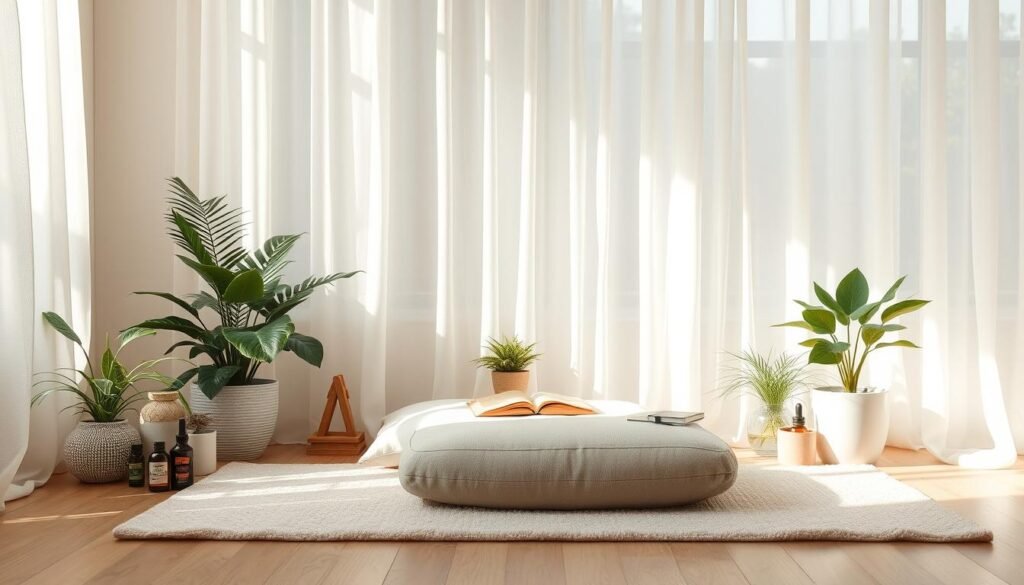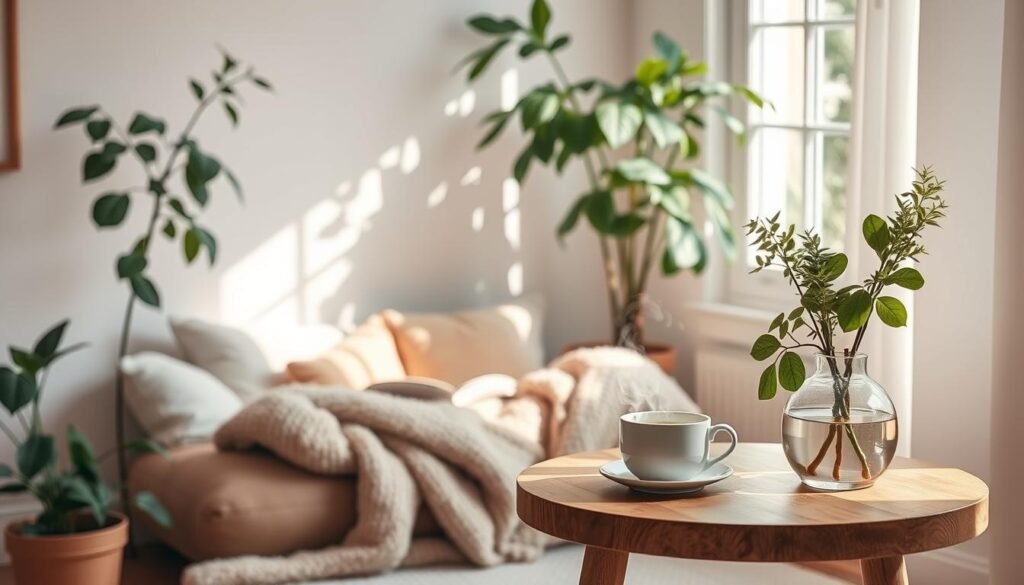How to Create a Self-Care Routine for a Mentally Healthier 2025
Some links on this page are affiliate links. This means we may earn a commission at no additional cost to you if you click through and make a purchase. Thank you for your support!
In today’s fast-paced world, it’s easy to forget the simple things that care for our minds and spirits. As we start a new year, I think about how self-care can change our mental and emotional health. I’ve dealt with anxiety and burnout, showing me how crucial self-care is for feeling grounded and strong.
This year, I aim to build a self-care habit that boosts my mental health and resilience. If you’re facing mental health issues or just want to improve your daily life, this article will show you how to create a self-care routine that fits your needs.
Key Takeaways
- Discover the foundations of self-care and its impact on mental wellness
- Explore the essential components of a daily self-care routine
- Learn how to build a nourishing morning routine for mental health
- Uncover physical self-care strategies that support emotional well-being
- Develop emotional intelligence and healthy coping mechanisms
Understanding the Foundations of Self-Care and Mental Wellness
Self-care is key to keeping our bodies, minds, and spirits healthy. It’s not just about pampering ourselves. It’s about taking care of our health and happiness every day.
Ignoring self-care can make us stressed, emotionally drained, and even burnt out. The U.S. Department of Health and Human Services says self-care is crucial for our mental health. It shows how important it is to make self-care a top priority.
Self-care covers many areas, including:
- Physical self-care: Eating well, drinking water, sleeping enough, and exercising regularly.
- Emotional self-care: Being mindful, grateful, and reflective to care for our feelings.
- Mental self-care: Doing things that challenge and excite our minds, like reading or learning new things.
- Social self-care: Connecting with others through activities or support groups.
- Spiritual self-care: Finding practices that match our beliefs, like meditation or spending time in nature.
Spending time on these self-care activities can bring many benefits. We can feel less stressed and anxious, focus better, be happier, and stay physically and mentally healthy.
“Regular self-care can lead to better mental health by reducing stress, anxiety, and symptoms of depression.”
Self-care is a personal journey. What works for one person might not work for another. The goal is to find what works for us and keeps us mentally and physically well.
Self-Care Routine Mental Health: Essential Components for Daily Practice
A good self-care routine includes many parts that help us feel better. At the core are mindfulness and gratitude exercises. They help us focus and start the day on a positive note.
Our physical health is also key. Regular exercise and a healthy diet boost our body and mind. Research shows self-care can lower anxiety, depression, and stress. It also makes us happier and better at handling tough times.
It’s also important to care for our social connections and set healthy boundaries. Good relationships and fun activities are vital for our mental health.
Adding these habits to our daily life makes a strong self-care plan. The World Health Organization says self-care is key to fighting mental illness worldwide.
- Mindfulness and gratitude practices set a positive tone for the day
- Physical self-care through exercise and balanced nutrition boosts mental well-being
- Social connections and healthy boundaries are essential for mental health
- A comprehensive self-care routine supports sustainable mental wellness
“Engaging in self-care is proven to reduce symptoms of anxiety, depression, and stress while increasing coping abilities and happiness levels.”

Creating a self-care routine takes time and effort, but it’s worth it. Regular self-care boosts self-confidence, reduces stress, and makes us happier. It also helps us work better and lowers the risk of serious health problems like heart disease and cancer.
Building a Strong Morning Routine for Mental Wellness
Starting your day with a routine can change your mental health. It sets a positive tone for the day. Let’s look at how to create a morning routine that boosts your well-being.
Start with a few minutes of mindfulness or meditation. It helps calm your mind and reduce stress. Exercise, like jogging or yoga, also boosts your mood and energy.
Then, try keeping a gratitude journal. Writing about the good things in your life can make you feel happier and more positive. Eating a healthy breakfast and staying hydrated also helps keep your mind clear and energized.
Everyone is different, so find what works for you. The goal is to create a routine that makes you feel good every day.

“A morning routine sets the tone for a mentally healthy day. Small, consistent habits can make a big difference in your overall well-being.” – Jane Doe, Mental Health Expert
Adding these activities to your morning can help you start the day right. Stay consistent, and you’ll see how it improves your mental health.
Physical Self-Care Strategies for Mental Well-being
Looking after our physical health is key to a good mental state. Regular exercise, enough sleep, and a healthy diet are vital. They all play a big role in our emotional and mental health.
Doing physical activities like jogging, yoga, or gym workouts boosts mood. Just 30 minutes a day can improve your mental health condition and emotional well-being.
Getting enough sleep is also crucial. Aim for 7-9 hours each night to keep your brain sharp. A regular sleep routine and a calm sleep space can boost your mental well-being.
Eating well is important too. A diet full of fruits, veggies, and whole grains helps both body and mind. Cut down on caffeine and sugar to avoid mood swings. Drinking plenty of water is also key for brain health.
Adding these physical self-care steps to your life can help a lot. Remember, self-care is personal. Find what works for you and stick to it.

“The greatest weapon against stress is our ability to choose one thought over another.” – William James
Emotional Intelligence and Self-Care Practices
Taking care of our emotional health is key to self-care. Developing emotional intelligence helps us understand and manage our feelings. This leads to better mental health and resilience. Journaling, meditation, and therapy can help us reflect and heal from trauma.
A 2021 study showed that mindfulness practices boost job satisfaction and lower burnout risk. Exercise also releases endorphins, which improve mood and reduce depression, stress, and anxiety.
Being isolated can make depression worse and weaken our immune system. Going to religious services can help us feel less lonely. Self-care can also improve our physical health, increase lifespan, and enhance overall well-being.
| Self-Care Activity | Benefit |
|---|---|
| Journaling | Improves self-awareness and emotional regulation |
| Meditation | Reduces stress and anxiety, enhances focus and calm |
| Therapy | Provides professional support for mental health issues |
Investing in emotional intelligence and self-care leads to a better work-life balance and less burnout. By focusing on these areas, we build emotional resilience. This helps us face life’s challenges more easily and clearly.

“Taking care of your mind and body is one of the most important investments you can make in yourself. When you’re emotionally and physically well, you’re better equipped to handle life’s ups and downs.”
Creating Boundaries and Managing Social Connections
Keeping healthy boundaries and building strong social ties are key for our well-being. In today’s busy world, setting limits helps us focus on what’s important. It helps us deal with anxiety, substance abuse, and life’s ups and downs. By setting clear boundaries, we can lower stress and boost our mental health.
Talking openly and clearly is vital for setting boundaries. Saying “I need some quiet time to myself” tells others what we need without blaming. This method is great for people with chronic conditions as it saves energy and helps them focus on their health.
Setting boundaries with family and friends can be tough, but it’s crucial for healthy relationships. Even if some resist at first, being prepared with thoughtful answers helps us stick to our boundaries. Taking care of ourselves through activities that recharge us is also key for our overall health.
The pandemic has made setting boundaries harder, especially with issues like mask-wearing. It’s important to respect each other’s comfort levels and talk openly. This way, we support each other and build a sense of community. Healthy boundaries protect our emotional health and help us live a balanced life.
“Setting boundaries is an act of self-love. It’s about respecting your needs and honoring your limits.”
In the end, setting boundaries and building social connections are core to self-care. These actions help fight isolation and loneliness, which harm our mental health. By focusing on these, we can lead a more fulfilling and balanced life.

Incorporating Mindfulness and Stress Management Techniques
Keeping your mental health and wellbeing in check is a big job. Using mindfulness and stress management can really help. Mindfulness helps you stay in the moment and focus on what’s happening now. It’s good for your mental health and overall wellness.
Studies show that 46% of Americans found it hard to keep their health up during the COVID-19 pandemic. But, 64% said they paid more attention to their mental health. Mindfulness can be a big help in tough times, helping with stress, anxiety, depression, and chronic pain.
Meditation is a great mindfulness practice. Just a few minutes each day can bring calm and clarity. Progressive muscle relaxation and guided imagery are also good for managing stress.
Adding mindfulness to your daily life can really change your mental and emotional health. It could be a morning meditation, a mindful walk, or just a few deep breaths. These practices help you be kind to yourself, improve your emotional smarts, and keep your mental health in check.
| Mindfulness Technique | Benefits |
|---|---|
| Meditation | Reduces stress, increases focus, and enhances emotional regulation. |
| Progressive Muscle Relaxation | Helps manage physical symptoms of stress by systematically tensing and releasing muscle groups. |
| Guided Imagery | Promotes relaxation and stress reduction by visualizing peaceful, calming scenes. |
By using these mindfulness and stress management techniques, you can help your mental wellbeing. You’ll be on your way to a healthier, more balanced life.
“Mindfulness is a way of befriending ourselves and our experience.” – Jon Kabat-Zinn
Nutrition and Hydration for Mental Health Support
Eating well and drinking enough water are key for taking care of your mind. Eating foods rich in nutrients like fruits, vegetables, whole grains, and lean proteins helps your mood and brain work better.
Omega-3 fatty acids in fish, flaxseeds, and walnuts can make you feel happier and support your brain. Probiotics in yogurt, kefir, and fermented vegetables help your gut and mood too.
Drinking enough water is vital for clear thinking and feeling good. Try to drink plenty of water all day. Adding cucumber slices or fresh herbs to your water can make it more fun.
Stay away from ultra-processed foods and too much sugar as they harm your mental health. Talk to a nutritionist for advice on eating well to feel better in 2025.
| Nutrient | Benefit for Mental Health | Food Sources |
|---|---|---|
| Omega-3 Fatty Acids | Improved mood and brain function | Fish, flaxseeds, walnuts |
| Probiotics | Enhanced gut-brain connection and emotional well-being | Yogurt, kefir, fermented vegetables |
| Magnesium | Supports nerve function and mood regulation | Leafy greens, nuts, whole grains |
| Zinc | Crucial for brain cell and neurotransmitter production | Oysters, red meat, poultry |
By choosing nutritious foods and staying hydrated, you build a strong base for your mental health. This will help you feel better in the coming year.
Digital Wellness and Mental Health Balance
In today’s world, it’s key to manage our tech use for our mental health. Finding a balance between online and offline life helps reduce stress and boosts mood. It also helps us build resilience.
To stay digitally well, we need to set limits on screen time and social media. Taking breaks from digital devices helps us focus better. Choose content that uplifts you and use apps that support your mental health.
- Make tech-free zones or times in your day for real-life interactions and thinking.
- Use healthy ways to cope with stress, like meditation, deep breathing, and exercise.
- Think positively and do activities that help you stay mentally strong.
By adding these habits to your daily life, you can make digital wellness a part of your routine. This way, you can focus on your mental health in today’s connected world.
| Statistic | Percentage |
|---|---|
| Employees working remotely who report challenges in maintaining a healthy work-life balance | 79% |
| Individuals who feel a need to be “always on” when working from home | 62% |
| Employees who admit to checking work-related devices outside of working hours | 67% |
| Individuals who believe that implementing a routine with breaks and personal activities is vital for maintaining well-being while working remotely | 85% |
| Individuals who find that setting clear boundaries between work and personal life leads to increased satisfaction and reduced stress levels | 73% |
By focusing on digital wellness and balancing online and offline life, you can live a more resilient and mentally balanced life. This empowers you to succeed in today’s digital world.
“The constant connectivity enabled by technology can be both a blessing and a curse. It’s up to us to set boundaries and reclaim control over our digital lives.”
Evening Routines for Better Mental Health
Creating a calming evening routine is key for better sleep and mental health. As the day ends, we need to relax. This helps our bodies and minds get ready to rest.
Mindfulness exercises and self-compassion practices are vital. Reflecting on the day and being thankful can calm us down. Gentle stretching or yoga also helps release tension.
It’s important to avoid screens before bed. The blue light from devices can mess with our sleep. Instead, try reading, listening to soft music, or journaling.
Make your bedroom sleep-friendly. Keep it cool, dark, and use calming scents like lavender. This helps improve sleep and builds mental resilience.
By adding these habits to your evening routine, you’ll sleep better. This supports your mental health and well-being.
“Implementing a consistent evening routine can be a powerful tool for promoting better sleep and enhancing your overall mental health and well-being.”
- Engage in mindfulness exercises and self-compassion practices to reflect on the day and express gratitude.
- Limit exposure to screens and stimulating content in the hours before bedtime.
- Create a comfortable, sleep-friendly environment with a consistent sleep schedule and use of aromatherapy.
- Incorporate healthy coping strategies like journaling, deep breathing, or light stretching to release tension and prepare for sleep.
- Prioritize emotional well-being habits and mental resilience building through your evening routine.
Conclusion
Creating a self-care routine is a journey that needs commitment and flexibility. It’s important to regularly check and change your self care routine mental health as your needs change. Remember, taking care of yourself is not selfish but necessary for your mental health and happiness.
By focusing on self care in all areas of your life, you can grow stronger, feel less stressed, and live a healthier life in 2025 and beyond. This includes taking care of your body, mind, emotions, social life, and spirit.
Adding mood-boosting activities and work-life balance tips to your daily life can greatly improve your mental health. Self-care helps prevent burnout, boosts emotional strength, and improves your overall well-being. Remember, your mental health is crucial, and taking care of yourself leads to a more rewarding life.
Keep going on your self-care path with kindness and patience towards yourself. Celebrate your achievements and don’t hesitate to ask for help from friends or mental health experts when you need it. By making self care a regular part of your life, you’ll become a healthier, more vibrant, and mentally strong person in the future.
FAQ
What is the importance of prioritizing mental health through self-care in 2025?
In 2025, taking care of your mental health is key. It makes you feel better and live a happier life. By making self-care a daily habit, you can handle life’s ups and downs better.
What are the different aspects of self-care?
Self-care covers many areas like physical, mental, emotional, social, and spiritual health. It’s not just about fancy things. It’s about simple steps like getting enough sleep, staying connected, and eating right.
Why is it important to create a comprehensive self-care routine?
A good self-care plan includes mindfulness, staying active, socializing, and managing stress. It boosts your mental health and well-being. It’s tailored to fit your needs for lasting benefits.
How can a strong morning routine support mental health?
A morning routine with mindfulness, exercise, gratitude, and a healthy breakfast sets a positive tone. It reduces stress, boosts mood, and sharpens your mind.
What are the key physical self-care strategies for mental well-being?
Regular exercise, good sleep, and a healthy diet are crucial. They release happy hormones and keep your brain working well.
How can emotional self-care practices improve mental health?
Emotional self-care like journaling, meditation, or therapy helps you understand and manage your feelings. It boosts your self-esteem and emotional health.
Why is setting healthy boundaries and nurturing social connections important for mental health?
Healthy boundaries and social connections offer emotional support and a sense of belonging. They fight off loneliness and isolation, which harm your mental health.
What are the benefits of incorporating mindfulness and stress management techniques?
Mindfulness through meditation, deep breathing, or walking improves stress handling and focus. It also helps regulate emotions, leading to better mental health.
How can nutrition and hydration support mental health?
Eating well and staying hydrated boosts mood and brain function. A balanced diet and plenty of water support your emotional well-being.
Why is managing digital technology use important for mental health?
Limiting screen time and social media helps avoid information overload. It improves focus and keeps a healthy balance between online and offline life.
How can an evening routine promote better mental health?
A calming evening routine with relaxing activities and gratitude can lead to better sleep. It helps you unwind and sleep well, improving your mental health.





